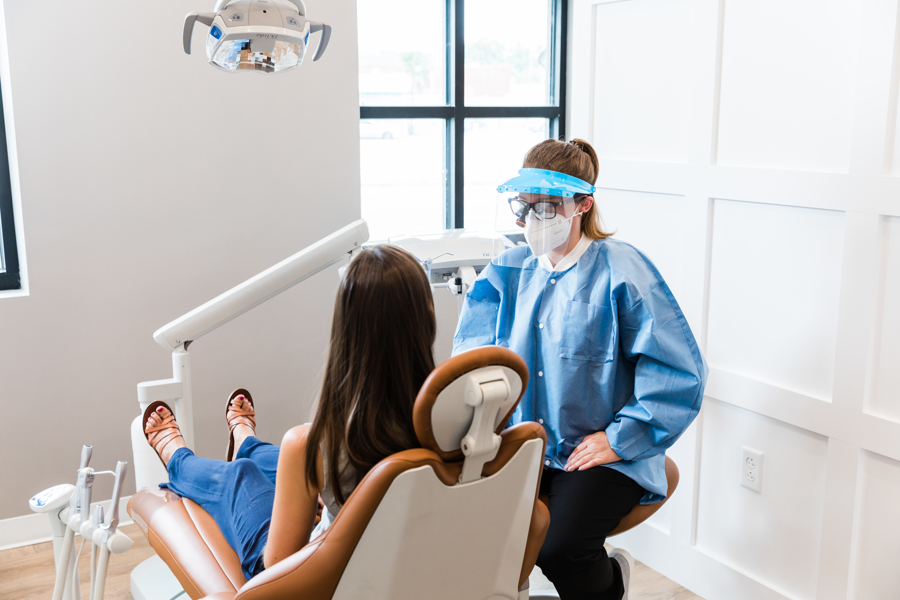Common Inquiries About Dental Veneers Responded To
Dental veneers have actually ended up being an increasingly sought-after option for those wanting to boost their smiles, yet many individuals remain unpredictable about different aspects of their use. Key questions often emerge concerning the application process, longevity, and possible threats related to these aesthetic enhancements. Moreover, the difference in between porcelain and composite veneers can substantially influence one's choice. As we explore these usual queries, it becomes important to consider not just the benefits however likewise the implications of selecting oral veneers in quest of an extra certain appearance. What factors should one evaluate before making such a decision?
What Are Dental Veneers?
Dental veneers are slim, custom-made coverings crafted from porcelain or composite resin that are designed to cover the front surface of teeth. These oral prosthetics offer both visual and useful functions, offering a service for different oral imperfections, consisting of staining, chips, voids, and imbalance. By sticking to the teeth, veneers can significantly enhance the overall appearance of a smile, developing a much more appealing and consistent look.
Porcelain veneers are particularly preferred for their all-natural translucency and discolor resistance, making them a perfect option for people looking for resilient outcomes. In contrast, composite material veneers are generally cheaper and can be applied in a solitary check out, but they might not offer the exact same toughness as porcelain choices.
The choice to go with dental veneers often stems from a desire for aesthetic improvement, yet people need to likewise take into consideration factors such as the long life of the product, maintenance needs, and the potential demand for tooth reduction (Porcelain Veneers Washington DC). Inevitably, oral veneers represent a efficient and flexible service for achieving a radiant smile, dealing with individual aesthetic needs while advertising confidence and self-worth
Just How Are Veneers Applied?
The application procedure for veneers requires cautious planning and precision to make certain optimum results. The procedure generally begins with a detailed consultation, where the dental practitioner examines the individual's oral health, talks about wanted outcomes, and determines the appropriate sort of veneers, whether porcelain or composite material.
As soon as the treatment strategy is established, the dental expert prepares the teeth by eliminating a thin layer of enamel, normally regarding 0.5 mm to 1 mm, to suit the veneer. This action is important as it ensures a correct fit and stops the veneers from appearing cumbersome - Low Cost Veneers. After preparation, impressions of the teeth are taken to develop custom-made veneers that match the patient's one-of-a-kind dental structure and visual choices
While the permanent veneers are being fabricated in an oral laboratory, short-lived veneers might be positioned to secure the prepared teeth. Once the irreversible veneers are ready, the dental professional will meticulously bond them to the teeth utilizing a solid dental adhesive.
What Are the Advantages?

In addition, veneers are recognized for their resilience and resistance to staining contrasted to all-natural teeth. Made from premium products such as porcelain or composite resin, they can preserve their appearance for many years with correct care. This long life makes them a functional investment in one's dental look.
Along with visual enhancements, veneers can additionally contribute to improved oral wellness. By covering harmed or weakened teeth, they can provide additional assistance and security, helping to stop more degeneration or wear and tear. This safety aspect can decrease the requirement for a lot more comprehensive oral procedures in the future.

The Length Of Time Do They Last?
With proper treatment and upkeep, oral veneers can last anywhere from 10 to 15 years, making them a long-lasting option for boosting one's smile. The longevity of veneers mainly relies on the material made use of, the quality of the preliminary positioning, and the patient's adherence to dental hygiene methods.
Porcelain veneers are recognized for their resilience and resistance to discoloration, commonly lasting closer to the 15-year mark when cared for appropriately. Composite veneers, while a lot more budget-friendly, might call for replacement quicker, often within 5 to ten years because of their vulnerability to put on and staining.

In addition, wearing a mouthguard during sports or nighttime can provide additional security. Inevitably, while veneers use a considerable aesthetic improvement, their longevity is substantially influenced by the commitment to correct oral care and routine assessments with a dental specialist.
Are There Any Threats?
Thinking about the transformative results of oral veneers, it is very important to acknowledge the potential risks connected with their application. While veneers can improve the look of teeth, the procedure involves the elimination of a thin layer of enamel, which can increase tooth level of sensitivity and susceptability to degeneration.
One substantial danger is the possibility of incorrect positioning or fitting, bring about pain, bite imbalance, or perhaps damages to the underlying tooth structure. Furthermore, if the veneers are not kept correctly, they can end up being tarnished or cracked over time, necessitating replacement.
People may also experience sensitive more helpful hints reactions to the products used in the veneers, particularly if they have level of sensitivities to particular oral composites. While veneers are sturdy, they are not unbreakable; too much force from grinding or clinching can lead to cracks.
It is crucial for people to talk to a certified dental specialist to review their specific risks and to comply with aftercare directions faithfully. By recognizing these risks, patients can make informed decisions concerning their dental veneer therapy and make sure the durability and success of their improvements.
Conclusion
In recap, dental veneers stand for a valuable cosmetic remedy for boosting smiles, with factors to consider regarding their application, benefits, long life, and linked threats. Inevitably, informed decision-making regarding oral veneers can lead to satisfying aesthetic end results and enhanced oral health.
Oral veneers are slim, tailor-made coverings see post crafted from porcelain or composite resin that are made to cover the front surface area of teeth. After prep work, impressions of the teeth are taken to produce personalized veneers that match the client's distinct dental structure and visual choices.
While the permanent veneers are being fabricated in an oral research laboratory, short-lived veneers may be positioned to protect the prepared teeth. As soon as the long-term veneers are all set, the dental expert will carefully bond them to the teeth utilizing a solid oral adhesive. Inevitably, educated decision-making relating to dental veneers can lead to satisfactory visual outcomes and enhanced oral wellness.